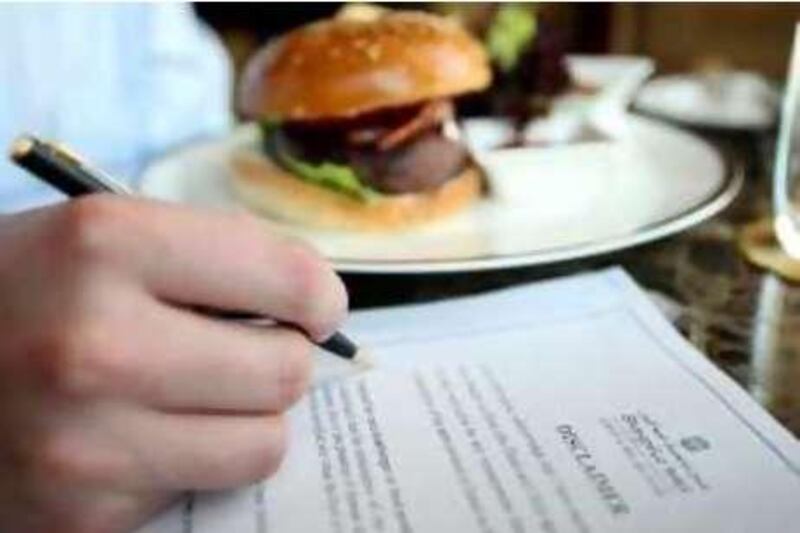At restaurants in the five-star Shangri-La Hotel chain, beef patties served anything less than well-done now come with an unusual side dish - a legal waiver. "We just want to make sure that we serve the best quality food and the safest," said Neil Rumbaoa, the director of communications at the Shangri-La Hotel in Dubai. "And so if it's rare, obviously there are factors that will contribute to how safe the food is."
The unusual legal procedure is meant to discourage customers from ordering rare or partially rare hamburgers and to protect the hotel from "any consequences that may result due to the consumption" of such meat. During a recent visit to one of the restaurants at the Shangri-La Hotel in Abu Dhabi, a reporter from The National was asked to sign a waiver after he ordered a medium -cooked hamburger. While hotel officials said diners who order medium or medium-rare burgers were not required to waive their rights in writing, waiters were normally obliged to ask diners to give their verbal consent to indemnify the hotel from legal action.
After that, the waiter is required to note the name of the guest, the temperature of the meat and the time at which it was served in the restaurant's logbook for future reference. That requirement, said Levent Tekun, the director of marketing at Shangri-La Hotel in Abu Dhabi, is a worldwide policy for the hotel chain. "As a company, globally, when a burger is ordered and a guest is asking for it to be medium or rare or something along those lines, our verbal phrase on that would be that the hotel prefers for the burgers to be well-done," said Mr Tekun.
"Then it's down to the guest to choose whether he wants it well-done or rare or whatever." In both Abu Dhabi and Dubai, customers who ask to take prepared food away from the hotel premises or use hotel facilities to store food from outside must sign a disclaimer. That practice is used in other hotel restaurants in the UAE, such as the Crowne Plaza Hotel. However, both Mr Rumbaoa and Mr Tekun said they did not know of other hotels that demanded verbal or written disclaimers from customers who consumed meat that was less than well-done.
Eating rare or raw ground beef carries the risk of illness from pathogenic strains of bacteria, mostly variants of the E.coli species. Thoroughly cooking the meat reduces the risk of infection to almost nil. In late June, the US Department of Agriculture announced a massive recall of ground beef that originated from processing plants in the state of Nebraska. Investigators suspected that the tainted meat led to 40 cases of E. coli infection, of which more than 20 people required hospitalisation.
For hotel guests and restaurant customers at the Shangri-La Hotel in Abu Dhabi, the policy seemed prudent, if unusual for this part of the world. None of those interviewed said they would sign a legal document to eat a hamburger. "I wouldn't eat it at all. It would totally put me off," said one customer, who asked to remain anonymous because "this hotel has been so good to us, I wouldn't want to say anything derogatory about" it.
"I would choose something else off the menu." She said a waiver was "a little less elegant" than a written reminder of the risks printed at the bottom of a menu - a common fixture in many American restaurants. "It's protecting the customer," said Mohammed Salha, a lunchtime customer at the Shangri-La's lobby cafe, The Lounge. "In the Arab world, whatever happens to you is your responsibility. In the States, you can close a chain of restaurants if you get a stomach ache, but here, it's a bit different."
Meanwhile, Mr Salha's friend, Abdallah Mohammed, said he would think twice about consuming a meal if he was asked to sign a waiver before his first bite - regardless of how it was cooked. "If you're so sure about the quality, why would you need some papers to sign?" he asked. "It would make the customer feel like there is something wrong with it." The Shangri-La Hotel's policy towards undercooked hamburgers and takeaway food, which it says has been in place for several years, is part of the luxury chain's compliance to a rigid set of international food safety standards called the Hazard Analysis and Critical Control Points (HACCP) system.
HACCP was developed during the 1960s by the US National Aeronautics and Space Administration to set safety standards for astronauts' food. The system is an important component of an even more rigorous set of international food quality norms delineated by the International Organisation for Standardisation called the ISO 22000. Shangri-La Hotels met ISO 22000 standards in April 2008 for the first time, said Mr Rumbaoa.
"It's actually quite technical," he said. "It just tells you that when you follow these standards to the letter, then nothing can go wrong. The quality will be there. The safety standards and hygiene standards will be there. Most of the hotels are gearing towards that." @Email:mbradley@thenational.ae






